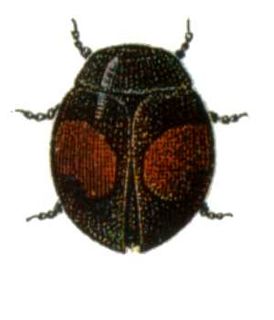
The Atlantic Portuguese Man o' War, also known as the man-of-war, is a marine hydrozoan found in the Atlantic, Indian and Pacific Oceans. It is one of two species in the genus Physalia, along with the Pacific Man o’ War or Australian Blue Bottle. Physalia is the only genus in the family Physaliidae. Its long tentacles deliver a painful sting, which is venomous and powerful enough to kill fish or, rarely, humans. Despite its appearance, the Portuguese man o' war is not a true jellyfish but a siphonophore, which is not actually a single multicellular organism, but a colonial organism made up of specialized individual animals called zooids or polyps. These polyps are attached to one another and physiologically integrated, to the extent that they cannot survive independently, creating a symbiotic relationship, requiring each polyp to work together and function like an individual animal.

The Agricultural Research Service (ARS) is the principal in-house research agency of the United States Department of Agriculture (USDA). ARS is one of four agencies in USDA's Research, Education and Economics mission area. ARS is charged with extending the nation's scientific knowledge and solving agricultural problems through its four national program areas: nutrition, food safety and quality; animal production and protection; natural resources and sustainable agricultural systems; and crop production and protection. ARS research focuses on solving problems affecting Americans every day. The ARS Headquarters is located in the Jamie L. Whitten Building on Independence Avenue in Washington, D.C. and the headquarters staff is located at the George Washington Carver Center (GWCC) in Beltsville, Maryland. For 2018, its budget was $1.2 billion.
Big-game hunting is the hunting of large game for meat, for other animal by-products, for trophy or for sport. The term is often associated with the hunting of Africa's "Big Five" game, and with tigers and rhinoceroses on the Indian subcontinent. Many other species of big game are hunted including kudu, antelope, and hartebeest. Whale, moose, elk, caribou, bison, mule deer, and white-tailed deer are the largest game hunted in North America, which is where most big-game hunting is conducted today.

Heterodonta is a taxonomic subclass of saltwater clams, marine bivalve molluscs. This subclass includes the edible clams, the cockles and the Venus clams.

Myrmecophagy is a feeding behavior defined by the consumption of termites or ants, particularly as pertaining to those animal species whose diets are largely or exclusively composed of said insect types. Literally, myrmecophagy means "ant eating" rather than "termite eating". However, the two habits often overlap, as both of these eusocial insect types often live in large, densely populated nests requiring similar adaptations in the animal species that exploit them.

Diomus notescens, common name the minute two-spotted ladybird is a ladybird species endemic to the east and south of Australia.

Spialia diomus, the common sandman or Diomus grizzled skipper, is a butterfly of the family Hesperiidae. It is found in tropical Africa and south-western Arabia.
Diomus pumilio is a species of ladybird. Its common name is Longblack Ladybird. It is found in North America, Oceania and Australia.

Diomus is a genus of lady beetles in the family Coccinellidae. There are at least 20 described species in Diomus.
Diomus bigemmeus is a species of lady beetle in the family Coccinellidae. It is found in North America.
Diomus debilis is a species of lady beetle in the family Coccinellidae. It is found in North America and Oceania.

Diomus amabilis, the amiable lady, is a species of lady beetle in the family Coccinellidae. It is found in North America.
Diomus roseicollis is a species of lady beetle in the family Coccinellidae. It is found in North America.
Diomus texanus is a species of lady beetle in the family Coccinellidae. It is found in North America.
Diomus xanthaspis is a species of lady beetle in the family Coccinellidae. It is found in North America.
Diomus liebecki, or Liebeck's lady, is a species of lady beetle in the family Coccinellidae. It is found in North America.

Diomus terminatus is a species of lady beetle in the family Coccinellidae. It is found in North America.
Our Planet (2019) is a British nature documentary series made for Netflix. The series is narrated by David Attenborough and produced by Silverback Films, led by Alastair Fothergill and Keith Scholey, who also created BBC documentary series Planet Earth, Frozen Planet and The Blue Planet, with collaboration with the conservation charity World Wildlife Fund (WWF).
Diomea or Diomeia was a deme of ancient Attica, located in the city of Athens, both within and outside the walls of Themistocles, in interior portion included the eastern sector of the city, and the external portion contained the Cynosarges. It was located south of the Ilisus, between Alopece to the south and Ancyle to the east. A gate of Athens was called the Diomean Gate. Originally in the phyle Aigeis, it was later in the phyle Demetrias.








